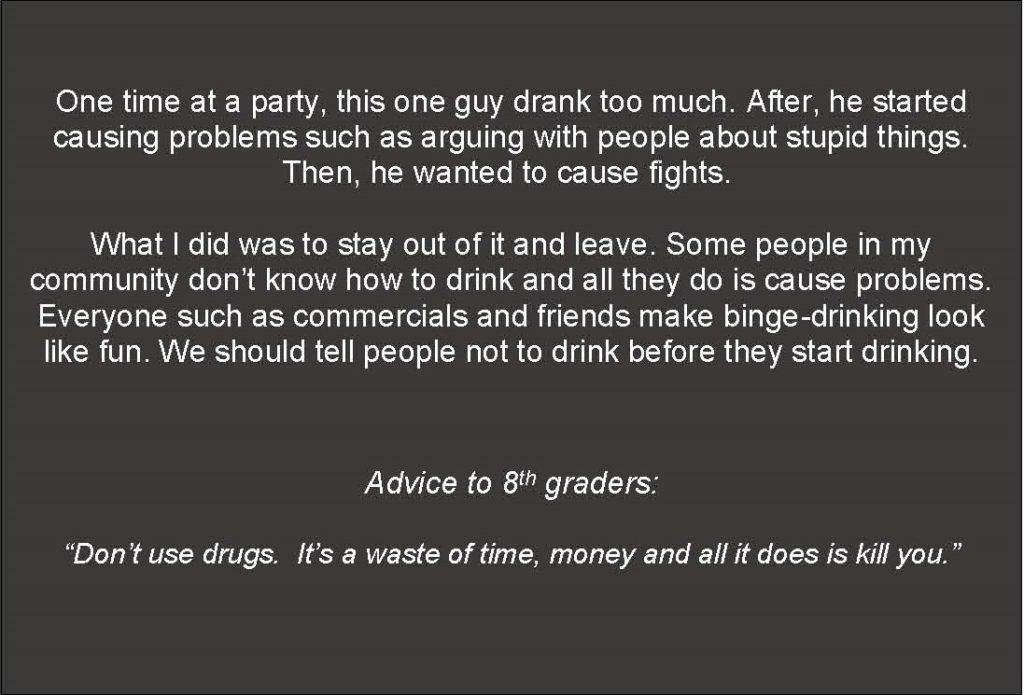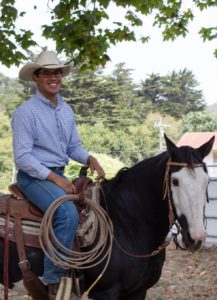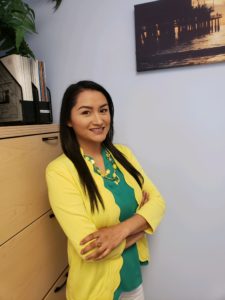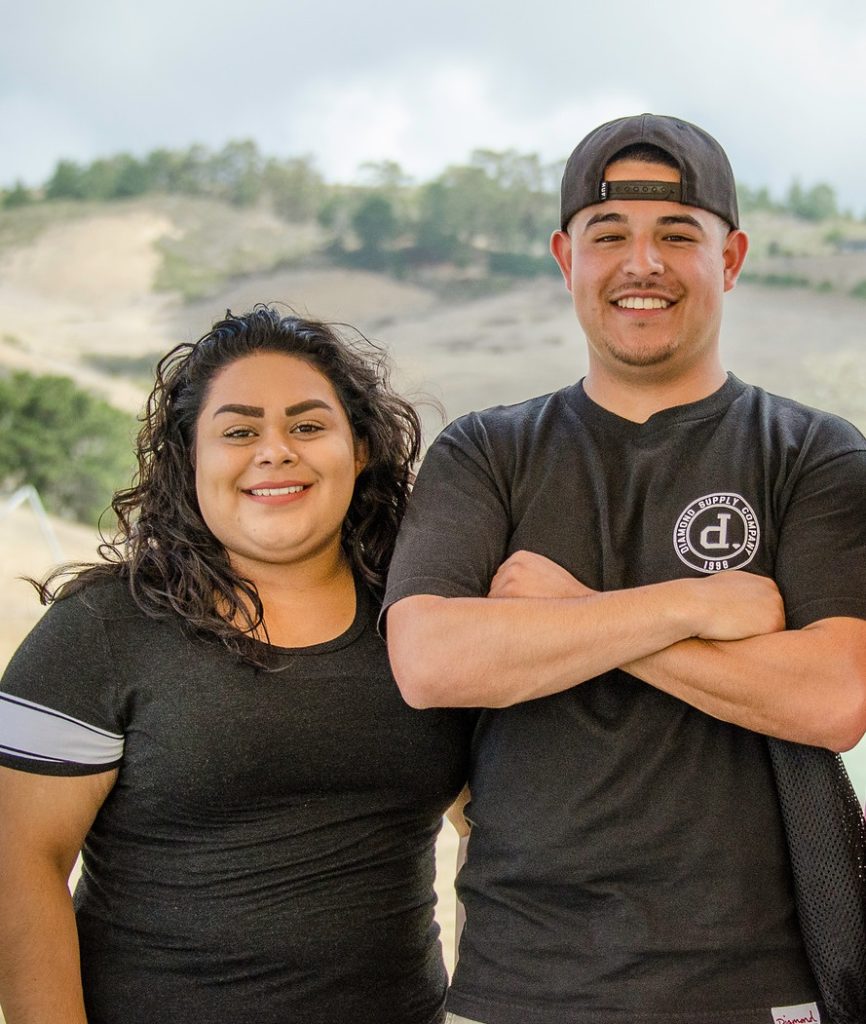
Have you ever considered how alcohol and drugs impact youth in our community? How advertising goes straight to our children’s brains? What happens when liquor cabinets are left in reach of our children? How easy is it for kids help themselves to beer from a cooler at a party? What quantities of marijuana are the dealers selling to youth? Our youth tell us that society, adults, dealers and peers have made it easy to access alcohol and drugs.
During this past school year, 24 youth have been working with Puente and the Youth Leadership Institute to create PhotoVoice Projects to answer the question of how they see alcohol and drugs affect the South Coast. They spent the year reflecting on the concept of ‘environmental prevention,’ looking at the large picture of what makes drugs and alcohol cool and accessible. They learned about creating big-scale change by looking at the root of the problem, rather than blaming the individual consumers. The teens were able to identify that big companies’ advertising, social media, the music and concert business all influence youth and their concept of alcohol and drugs.
These technologically oriented youth went out with their phones and each captured an image that represented how alcohol and drugs impact their communities.
The results were real, raw and jarring. The youth put it out there and named how much drugs and alcohol are in their face all the time and how easily accessible they are. While not all teens use or try drugs or alcohol, the youth seemed touched by alcohol and drugs in a myriad of ways, such as witnessing adults drink too much, peer pressure, seeing signs up upon entering the town, considering what to do with themselves when bored, and watching their peers use.
They each wrote a caption summarizing the meaning of their photo, some telling personal stories. The youth will display their works at the 2018 Youth Summit to eighth graders and community leaders. They will also be displayed at the Farmers’ Market in Pescadero in June 2018.
The teens each wrote out a prevention message to the eighth graders who will be viewing their work and quite possibly relating to it. Messages include:
“Don’t let peers pressure you to consume alcohol and drugs.”
“Have better communication with parents and school.”
“Don’t use drugs. It’s a waste of time, money and all it does is kill you.”
“Understand what you are putting into your body before you do it.”
“Do your research, use your brain.”
“Never do alcohol and drugs. That’s not cool and it is not going to make you cool.”
These youth are in the final stages of this project and their last steps will be to analyze the themes in their PhotoVoice as quantitative data. Then, they will present their findings to local leaders with some recommendations. Many of the youth have included recommendations in their PhotoVoice displays. Some examples are:
“Companies…should put videos of what could happen using their products.”
“If there were a place, in our community for all of us to hang out together and have other options, like milkshakes, kids would have more options rather than hanging out in their cars [smoking].”
“Kids would not drink if there were a lot more things to do here, like something fun.”
“If there were more interesting activities in our community, then teens would probably use less.”
In order to talk through the complexities of the experiences that the youth have encountered surrounding drugs and alcohol, the project was led by Puente Behavioral Health Therapists Suzie Budrick-Hughes, MFT and Mariela Lopez, ASW in Partnership with San Mateo County Prevention Social Worker, Samantha Johnston, LCSW. The Youth Leadership Institute funded this project, provided technical support and training, and in the final stages of completing the works, collaborated their Half Moon Bay Chapter with ours.
Puente has been doing alcohol and prevention work on the South Coast for the past 15 years. We have been doing Project Success groups with all the 5th grade and 8th grade classes each spring to intervene early about the risks of drugs and alcohol use. In addition, Puente does separate Alcohol and Drug Prevention groups focused on providing a forum for teens to talk about issues that come up and problem solve. Puente’s Summer Youth Leadership Development and Employment program keeps youth busy and productive all summer, building up work capacity, self-esteem and leadership skills. The program supports the youth all school year as well, providing ongoing support and positive activities.
The Puente Behavioral Health team also sees youth individually, addressing such issues as alcohol and drug use in the family, at risk behavior and substance use. This department provides counselling services to community members of all ages free of cost. We do provide individual, family and group therapy with professional and licensed clinicians. Anyone needing these services can call the main office to request a referral form.
If you would like to support counseling services on the South Coast, please donate today.
This program is funded by Youth Leadership Institute.
Empoderar a los jóvenes para que cuenten su historia a través de la fotografía digital.
¿Alguna vez ha considerado cómo el alcohol y las drogas afectan a los jóvenes en nuestra comunidad? ¿Cómo los anuncios influyen directamente los cerebros de nuestros hijos? ¿Qué sucede cuando el licor queda al alcance de nuestros hijos? ¿Qué tan fácil es para los niños alcanzen una cerveza de un refrigerador en una fiesta? ¿Qué cantidades de marijuana están vendiendo a los jóvenes? Nuestros jóvenes nos dicen que la sociedad, los adultos, los vendedores y los compañeros han hecho que sea fácil acceder al alcohol y las drogas.
Durante este año escolar, 24 jóvenes trabajaron con Puente y el Youth Leadership Institute para crear un proyecto llamado PhotoVoice para responder a la pregunta, cómo ven que el alcohol y las drogas afectan la Costa Sur. Pasaron el año reflexionando sobre el concepto de “prevención ambiental”, mirando la razón mas grande de porque las drogas y el alcohol son tan populares y accesibles. Aprendieron sobre la creación de cambios a gran escala mirando la raíz del problema, en lugar de culpar a los consumidores individuales. Los adolescentes pudieron identificar que los anuncios, las redes sociales, la música y los conciertos grandes influyen en los jóvenes y su concepto del alcohol y las drogas.
Estos jóvenes, tecnológicamente orientados, salieron con sus teléfonos y cada uno captó una imagen que representaba cómo el alcohol y las drogas afectan a sus comunidades.
Los resultados fueron reales, crudos y discordantes. Los jóvenes lo compartieron y mencionaron como todo el tiempo estan rodeados por las drogas y el alcohol, y qué tan accesibles son. No todos los adolescentes usan o prueban drogas o alcohol, los jovenes parecían estar afectado por el alcohol y las drogas de muchas maneras. Como cuando presencian a los adultos beber demasiado, presión de grupo, ver letreros al entrar al pueblo, o cuando están aburridos y ven a sus compañeros usar, ellos talvez consideran usar también.
Cada uno de ellos escribió una capción que resume el significado de su foto, algunos contando historias personales. Los jóvenes tienen programado exhibir sus trabajos en la convencion Youth Summit del 2018 a los estudiantes de octavo grado y líderes comunitarios que asistirán. Además, se mostrarán en el Mercadito en Pescadero.
Cada uno de los adolescentes escribió un mensaje de prevención para los estudiantes de 8º grado quienes verán su trabajo y muy posiblemente se relacionarán con el trabajo. Los mensajes incluyen:
“No permitas que los compañeros te presionen para que consumas alcohol y drogas”.
“Tener una mejor comunicación con los padres y la escuela”.
“No uses drogas. Es una pérdida de tiempo, dinero y todo lo que hace es matarte “.
“Comprende lo que te estás poniendo a tu cuerpo antes de hacerlo”.
“Haz tu investigación, usa tu cerebro”.
“Nunca hagas alcohol y drogas. Eso no es usar tu inteligencia y no te hará sentir bien “.
Estos jóvenes se encuentran en las etapas finales de este proyecto y sus últimos pasos serán analizar los temas en su PhotoVoice como datos cuantitativos. Luego, presentarán sus hallazgos a los líderes locales con algunas recomendaciones. Muchos de los jóvenes han incluido recomendaciones en sus pantallas PhotoVoice. Algunos ejemplos son:
“Las compañías … deberían poner videos de lo que podría suceder con sus productos”.
“Si hubiera un lugar, en nuestra comunidad donde todos pudiéramos pasar el tiempo juntos y tener otras opciones, como batidos, los niños tendrían más opciones en lugar de pasar el tiempo en sus automóviles [fumando]”.
“Los niños no beberían si hubiera muchas más cosas que hacer aquí, como algo divertido”.
“Si hubiera actividades más interesantes en nuestra comunidad, entonces los adolescentes probablemente usarían menos”.
Para hablar de las complexidades de las experiencias que los jóvenes han encontrado en torno a las drogas y el alcohol, el proyecto fue liderado por las terapeutas de Puente, Suzie Budrick-Hughes, MFT y Mariela Lopez, ASW en sociedad con la trabajadora social de prevención del condado de San Mateo, Samantha Johnston, LCSW. Youth Leadership Institute financió este proyecto, brindó apoyo técnico y capacitación, y en las etapas finales de las obras, se asoció el capítulo de Half Moon Bay con el grupo de Pescadero.
Puente ha estado haciendo trabajo de prevención y alcohol en la costa sur durante los últimos 15 años. Hemos estado haciendo grupos de “Project Success” con todas las clases de 5º y 8º grado cada primavera para intervenir temprano sobre los riesgos del consumo de drogas y alcohol. Además, Puente separa a los grupos de Prevención del Alcohol y las Drogas enfocados en proporcionar un foro para que los adolescentes hablen sobre los problemas que surgen y como tratar de resolver los problemas. El programa de Desarrollo y Liderazgo Juvenil de Puente es una manera en que los jóvenes se mantienen ocupados y productivos durante todo el verano, aumentando la capacidad de trabajo, la autoestima y las habilidades de liderazgo. El programa también apoya a los jóvenes durante el año escolar, brindando apoyo continuo y actividades positivas.
El equipo de consejeros de Puente también asiste a los jóvenes de forma individual, abordando cuestiones tales como el consumo de alcohol y drogas en la familia, el comportamiento de riesgo y el uso de sustancias. Este departamento ofrece servicios de consejería a miembros de la comunidad de todas las edades de forma gratuita. Proporcionamos terapia individual, familiar y grupos con consejeros profesionales y con licencia. Cualquier persona que necesite estos servicios puede llamar a la oficina principal para solicitar un formulario de referencia.
Si desea apoyar servicios de consejería en la Costa Sur, por favor haga su donación hoy.
Este programa está financiado por Youth Leadership Institute.

 Every day in college, Jose Resendiz woke up, grabbed his books and walked to class at Rensselaer Polytechnic Institute, a small engineering school in a rural pocket of upstate New York. At first, his life there felt so different from his Pescadero childhood that it could well have been happening in another country. Resendiz was the only Californian in his classes, and one of the only Hispanics. When the first winter came, he had only packed a raincoat and no winter boots. His hometown and family were 3,000 miles away.
Every day in college, Jose Resendiz woke up, grabbed his books and walked to class at Rensselaer Polytechnic Institute, a small engineering school in a rural pocket of upstate New York. At first, his life there felt so different from his Pescadero childhood that it could well have been happening in another country. Resendiz was the only Californian in his classes, and one of the only Hispanics. When the first winter came, he had only packed a raincoat and no winter boots. His hometown and family were 3,000 miles away.




